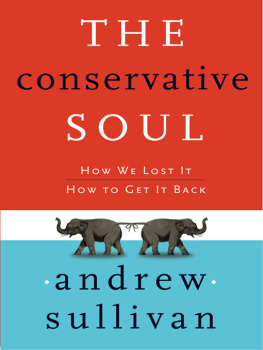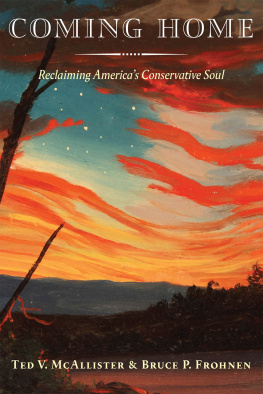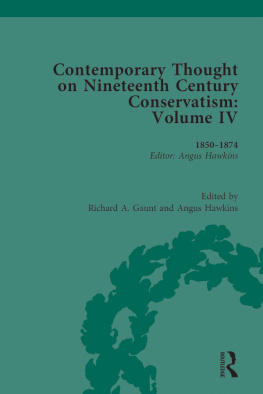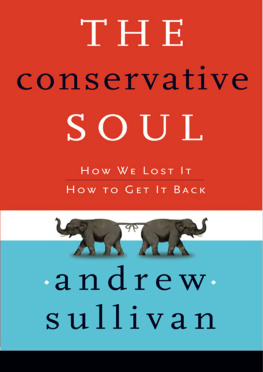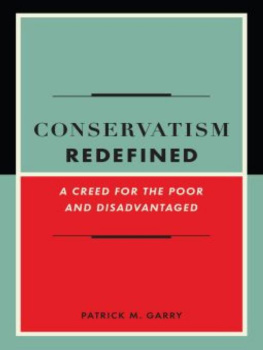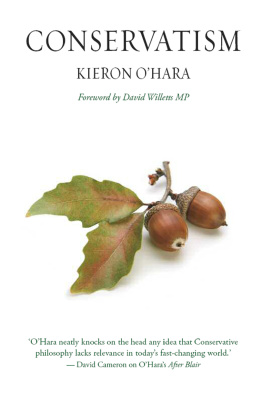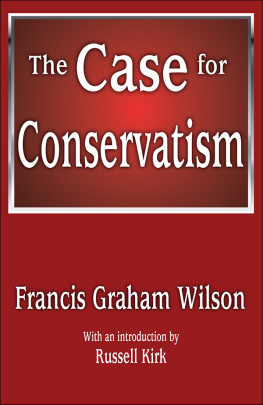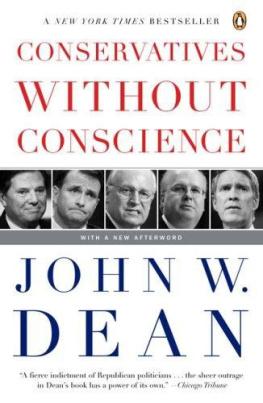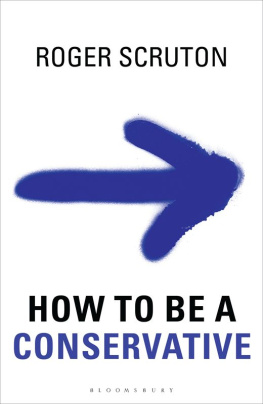The true value of a man is not determined by his possession, supposed or real, of Truth, but rather by his sincere exertion to get to the Truth. It is not possession of the Truth, but rather the pursuit of Truth by which he extends his powers and in which his ever-growing perfectibility is to be found. Possession makes one passive, indolent, and proud. If God were to hold all Truth concealed in his right hand, and in his left only the steady and diligent drive for Truth, albeit with the proviso that I would always and forever err in the process, and to offer me the choice, I would with all humility take the left hand, and say: Father, I will take thisthe pure Truth is for You alone.
T HIS BOOK WAS BORN OUT OF FRUSTRATION . F OR ALMOST all my life, Ive considered myself a conservative. But in the past few years, Ive found myself having to explain this more and more. The questions keep mounting up: How can you be gay and conservative? How can you support banning all abortion? How can you have bought into the Iraq war? How can you back dangerous theocrats? How can you supportand then you fill in the blank for various politicians whose vacuity and odiousness seem, to the questioner, indisputable.
There have been many times when I have felt like throwing in the towel and simply saying: all right, Im not a conservative, if thats what it now means. But there have been many other times when I have found myself drawn into long and often interesting arguments about what conservatism can now mean, what it has meant in the past, whether it means the same thing in Britain and America, and whether it now encompasses so many ideas and factions that it can barely be described at all.
This book, for what its worth, is an attempt to explain what one individual person means by conservatism. Its an attempt to account for what has happened to it to cause such confusion and debate, and why the version I favor is one I still believe is the best way of approaching the exigencies of our current, perilous moment.
My conservative lineage is an idiosyncratic one, and its worth getting on the table here, just so you can see where Im coming from. My personal journey may, indeed, make my conservatism idiosyncratic in the current American or British debate. So be it. I cannot change who I am and where I came from. All I can do is make an argument and hope you find something worthwhile in it.
I grew up in Britain in the 1970s and 1980s. I was a teenage Thatcherite, excited by a conservative leader who, by sheer force of will, transformed a countrys economy and society from stagnation to new life. In an English high school, I also wore a Reagan 80 button and saw the former California governor as the Wests best hope for survival against socialism and Communism. The conservatism I grew up around was a combination of lower taxes, less government spending, freer trade, freer markets, individual liberty, personal responsibility, and a strong anticommunist foreign policy. I was also a devout Catholic, who felt that my own faith was often scorned or misunderstood by those in power. My faith also told me that there was more to life than politics; and that the best form of politics was that which enabled us to engage in nonpolitical life more fully and more freely.
My intellectual heroes in my teenage years were not unusual for a young right-winger: George Orwell, Aleksandr Solzhenitsyn, Vclav Havel, Friedrich Hayek. Yes, I was a nerd, although I somehow managed to avoid a crush on Ayn Rand at any point. But I was also excited by the battle of ideas, and saw the height of ideological combat in the last years of the cold war as an exhilarating time to be alive and thinking. I became interested in politics because I saw how politics could make a difference in the world. And when I lived to see communist tyranny evaporate, and freedom and prosperity spread so widely in the wake of the last great totalitarian nightmare, I felt I had been a witness to something great and ennobling. I still do.
I came to America at the height of the end of the cold wara few months before Ronald Reagans reelection, which I heartily backedand have happily lived in the United States ever since. In the 1990s, when the battle over free markets and communism seemed to have been resolved into a sharp, unexpected victory for the side I had taken, I felt more able to pick and choose in politics, American and British. I had moved to a country well to the right of the one I had left, and found much to like and admire about the place. I still favored Reagan and the first president Bush. But I managed to find the centrist policies of Bill Clinton and Tony Blair congenial in many ways as welland saw them both as critical to reconciling what was left of the left to the new market economy. I didnt think backing a moderate liberal as some kind of betrayal of conservatism. In fact, I thought it was a sign of conservatisms success that I could do so with so few regrets.
Ive never been a partisan, Tory or Republican, because Im not a joiner by nature. It has never disturbed me that we have two party systems in the Anglo-American West, and Ive often felt willing to back a reformed party of the left if the governing party of the right had become exhausted or corrupt. So I endorsed Clinton in 1992 and Blair in 1997. As a conservative, I narrowly backed George Bush over Al Gore in 2000, because I found Gores newly statist and populist persona to be fake, and worryingly left-wing. By 2004, however, I felt forced to back John Kerry because of the ineptness and nonconservative recklessness I saw in the Bush administrations first term. Some may call this picking and choosing some sort of flip-flopping. I dont. I consider it an aspect of being an individual, trying to figure out the world as it is, rather than as I might wish it to be.
This book explains how I have come to find myself increasingly estranged from the Republican Party, from the policies it now stands for, and from the philosophy it now represents. My discomfort is shared by many to different degrees, but my own journey can only speak for itself. In saying this, I will inevitably come across as some kind of preening purist, claiming the mantle of true conservatism for my own wish-list of ideas, while dismissing others in Republican or Tory ranks as somehow phonies. But that is not my intent. Of course, by favoring one version of conservatism over another, I am not neutral in the argument. But conservatism has become such a large and sprawling complex of ideas that no one has a monopoly on the term anymore. I dont want to get into an emotional and pointless battle over semantics or labels. So let me concede up front that plenty of people who strongly disagree with the analysis and argument of this book are still, in my mind, legitimately be called conservative.
All I ask in return is an acknowledgment that the kind of politics I favor and argue for in this book is also well within the bounds of the Anglo-American conservative tradition. I may be in a minority these days, but what matters is the argument, not the number of people behind it. Perhaps this conservatism now has a brighter future among Democrats and Independents than among Republicans. But I hope that many disenchanted Republicansand even more modernizing Tories in Britainwill find plenty to agree with. I also beg forgiveness in advance for the inevitable simplification of very complex events and ideas that are still too close to us for a truly disinterested assessment. This is not an attempt at a definitive account of conservatism. It is an essay in defense of an idea of conservatism now in eclipse.
In that sense, it is doubly conservative. In defending what might seem a lost or losing cause, I have adopted the usual conservative posture of sadness at the pace and direction of current events.

